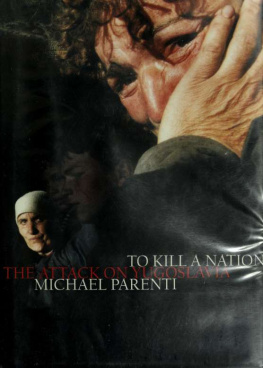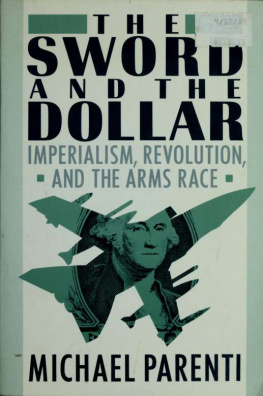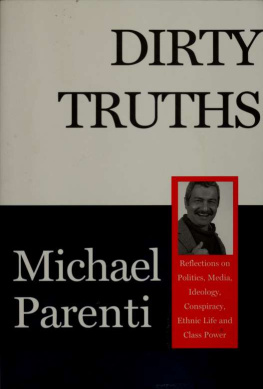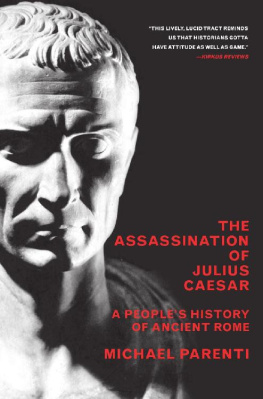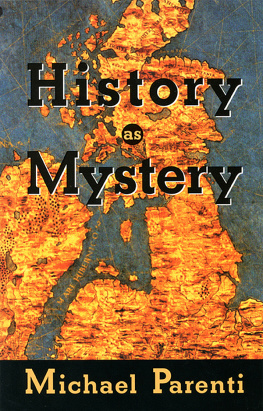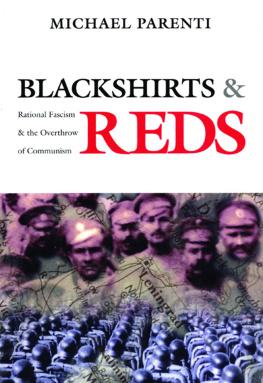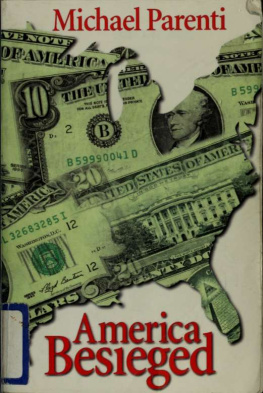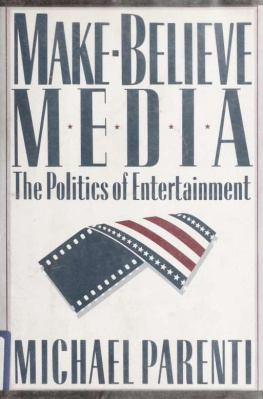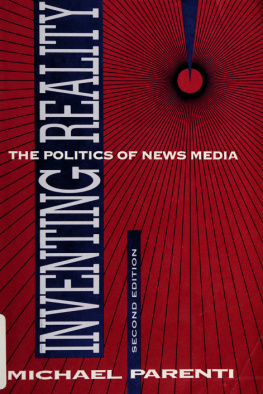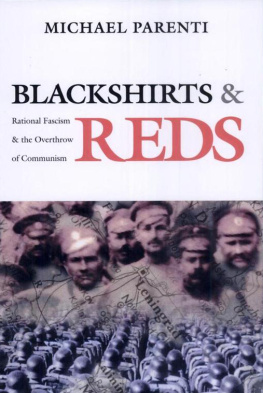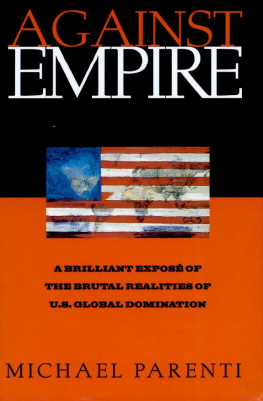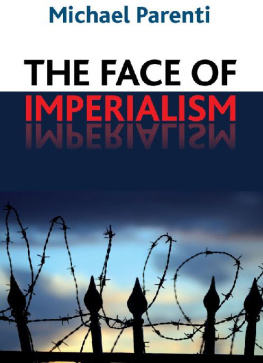Michael Parenti - To Kill a Nation: The Attack on Yugoslavia
Here you can read online Michael Parenti - To Kill a Nation: The Attack on Yugoslavia full text of the book (entire story) in english for free. Download pdf and epub, get meaning, cover and reviews about this ebook. year: 2000, genre: Politics. Description of the work, (preface) as well as reviews are available. Best literature library LitArk.com created for fans of good reading and offers a wide selection of genres:
Romance novel
Science fiction
Adventure
Detective
Science
History
Home and family
Prose
Art
Politics
Computer
Non-fiction
Religion
Business
Children
Humor
Choose a favorite category and find really read worthwhile books. Enjoy immersion in the world of imagination, feel the emotions of the characters or learn something new for yourself, make an fascinating discovery.
- Book:To Kill a Nation: The Attack on Yugoslavia
- Author:
- Genre:
- Year:2000
- Rating:3 / 5
- Favourites:Add to favourites
- Your mark:
- 60
- 1
- 2
- 3
- 4
- 5
To Kill a Nation: The Attack on Yugoslavia: summary, description and annotation
We offer to read an annotation, description, summary or preface (depends on what the author of the book "To Kill a Nation: The Attack on Yugoslavia" wrote himself). If you haven't found the necessary information about the book — write in the comments, we will try to find it.
To Kill a Nation: The Attack on Yugoslavia — read online for free the complete book (whole text) full work
Below is the text of the book, divided by pages. System saving the place of the last page read, allows you to conveniently read the book "To Kill a Nation: The Attack on Yugoslavia" online for free, without having to search again every time where you left off. Put a bookmark, and you can go to the page where you finished reading at any time.
Font size:
Interval:
Bookmark:

This book made available by the Internet Archive.




To the peoples of the former Yugoslavia with the hope that they may be allowed to live in peace with justice.
Digitized by the Internet Archive in 2015
https://archive.org/details/tokillnationatOOpare
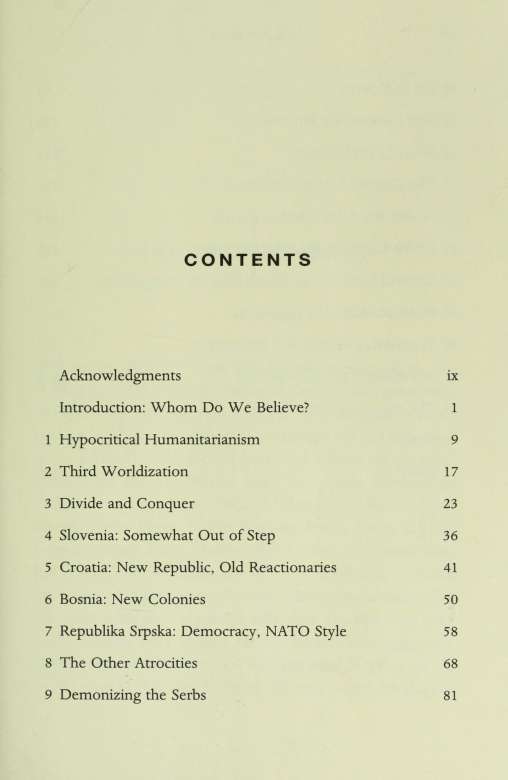
Gregory Elich and Barry Lituchy, two superb Balkan specialists, did a critical reading of the text and generously put their deep expertise at my disposal. In so doing, they saved me from a number of false steps and brought me to a command of the subject I could not have achieved entirely on my own. Marie-Pierre Lahaye, Shayna Gluck Lazarevich, Herman de Tollenaere, Peggy Karp, William Blum, Sard Rifati, Carol Bloom, James Petras, Robin Eastman-Abaya, Frank Lucido, Lenora Foerstel, Maria Makela, Beth Garber, Jane Scantlebury and Joyce Clyde furnished me with a treasure lode of useful materials and in some cases also took time to discuss issues that this book addresses. Incidental talks over the past year with Michel Collon, Peter Phillips, Richard Becker, Carl Boggs, and Karen Talbot also bolstered my determination to try to set the record straight. My son, Christian Parenti, shared his insights with me and saved the day by coming up with the title for this book. Mark Ingles, Willa Madden, and Michelle Pomeroy kept me going at the technological end. Chellis Glendinning provided much appreciated support as I came down to the finish line. And Colin Robinson, Niels Hooper, and others at Verso lent their valuable assistance. To all these fine people I give my heartfelt thanks.
This book deals with the lies our leaders have been telling us for more than a decade about events in the former Yugoslavia, and how these events fit into the broader context of US global policy. In the pages ahead I investigate the conflicts leading to the dismemberment of that country, and the interests motivating US leaders and their NATO allies.
I am not one of those critics who think that Western policy vis--vis Yugoslavia has been misdirected or confused. Top policy makers are intelligent, resourceful, and generally more aware of what they are doing than those who see them as foolish and bungling. US policy is not filled with contradictions and inconsistencies. It has performed brilliantly and steadily in the service of those who own most of the world and who want to own all of it. That some critics may not know what policy makers are doing does not mean the policy makers themselves do not know what they are doing. That Western leaders make misleading statements about their goals and intentions does not denote confusion on their part but a desire to confuse their publics as to what interests they are really serving. That they are misleading others does not mean that they are themselves misled, although of course there are times when they make mistakes and suffer bafflement in regard to tactics and timing.
But seldom are they confused about their opposition to socialism, and their dedication to free-market globalization and what they euphemistically call democratic reforms. In the last decade or so, they have become more open about the powerful economic interests behind their pursuit of democracy. And whenever democracy actually begins to work too well, whenever it begins to thwart or limit the neoliberal free-market agenda rather than act as its legitimating cloak, their dedication readily shifts from free-market democracy to free-market autocracy.
I will argue that Western intervention in Yugoslavia has not been benign but ruthlessly selfish, not confused but well directed, given the interests that the interventionists serve. The motive behind the intervention was not NATO's new-found humanitarianism but a desire to put Yugoslaviaalong with every other countryunder the suzerainty of free-market globalization. I am not the only one who sees the conflict this way; the decision-makers themselves do too. As I will show, they have been far more concerned about privatization and neoliberal reforms (rollbacks) than about the well-being of the various Yugoslav peoples.
Western leaders talk of peace, and perpetrate merciless wars. They call for democracy while supporting ex-Nazis and fostering despotic intercessions. They hail self-determination while exercising coercive colonial rule over other peoples. They denounce ethnic cleansing while practicing it themselves. This is what I shall attempt to demonstrate in the pages ahead.
Much of the debate about the Yugoslav conflict revolves around questions like: Whom do we believe? What sources do we rely on? Is it the free and independent Western media or Belgrades government-controlled press? I would answer as follows: The US media, as with most of the news media in other Western nations, are not free and independent. They are owned and controlled by largely conservative corporate cartels that adhere to the self-serving neoliberal ideology of international finance capital. The goal of these politico-economic elites is to transform the world into a global economy under the tutelage of the transnational corporations, backed by the unanswerable imperial might of the United States and its allies. A key component of that global strategy, of course, entails capitalist restoration within the former Communist countries. The corporate-owned media seldom stray too far from that dominant ideological paradigm, not only in the news that is reported but also in its editorials, commentaries, and opinion pieces. To the extent that journalists raise critical questions about policy, it is almost always at the operational level: Are the bombings proving effective? Is the refugee problem under control? Never do they question the underlying presumptions that brought about the bombings and created the refugees.
The publicly owned media, such as PBS and NPR in the United States or the BBC in Britain are not much better. They cannot be considered free and independent either. They function in an enduring political culture, subject to pressures from those who fund them (including, in the case of PBS and NPR, the federal government and large corporations). And they are no more immune to the hegemonic ideology than other mainstream institutions. Indeed, the public media have shown themselves to be eager cheerleaders for the official line on Yugoslavia.
So corporate-dominated media rather faithfully reflect the line put out by corporate-dominated political leaders, those decision makers who build their careers in service to the economic powers that be. In regard to Yugoslavia, the Western press dropped all pretense at critical independence andwith some notable exceptionswent into overdrive to demonize the Serbs and create the sensationalist justification for NATO's destabilizing and violent interventions.
If Western sources are not reliable, can we rely on Yugoslav sources? While no doubt intent upon giving only their side of the story, Belgrade's official releases might contain useful and reliable information. Thus if Belgrade reported that the mass graves which supposedly littered Kosovo were nowhere to be found once the NATO forces occupied that province, or that Albanian separatists destroyed eighty Serbian Orthodox churches, monasteries, and other religious edifices in Kosovo since the NATO occupation, there is no reason to assume
Font size:
Interval:
Bookmark:
Similar books «To Kill a Nation: The Attack on Yugoslavia»
Look at similar books to To Kill a Nation: The Attack on Yugoslavia. We have selected literature similar in name and meaning in the hope of providing readers with more options to find new, interesting, not yet read works.
Discussion, reviews of the book To Kill a Nation: The Attack on Yugoslavia and just readers' own opinions. Leave your comments, write what you think about the work, its meaning or the main characters. Specify what exactly you liked and what you didn't like, and why you think so.

